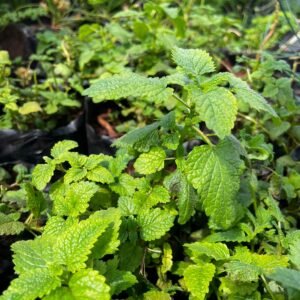Candyleaf (Stevia) Herb Seedlings
Many studies have shown that Stevia leaf preparations as a natural non-calorie sugar substitute are not only safe for people with diabetes, high blood pressure, and obesity but also can be used for the treatment of these diseases or prevention of their complications.
Where to buy Stevia seedlings in Kenya? Welcome to Pasharn Fruit Nursery Ltd, +254 783 448 742
KSh 350.00
CompareStevia, (Stevia rebaudiana), is a flowering plant in the aster family (Asteraceae) grown for its sweet-tasting leaves. The plant is native to Paraguay, where it has a long history of use by the Guaraní people. The leaves contain some sweet-tasting chemicals known as steviol glycosides, which can be used fresh or dried to sweeten beverages or desserts and can be commercially processed into powdered noncaloric sweeteners. Steviol glycosides, particularly the chemicals stevioside and rebaudioside A, can be more than 300 times sweeter than table sugar and are nonglycemic (i.e., they do not affect blood glucose levels). Touted as a healthier alternative to sugar, stevia sweeteners grew in popularity worldwide in the early 21st century. See also stevia (sweetener).

As an alternative to sucrose, or table sugar, using stevia as a sweetener carries the potential for considerable health benefits.
Stevia is considered “no-calorie” on the FoodData Central (FDC)Trusted Source. Stevia does not strictly contain zero calories, but it is significantly less calorific than sucrose and low enough to be classified as such.
The sweet-tasting components in stevia sweeteners occur naturally. This characteristic may benefit people who prefer naturally sourced foods and beverages. The low-calorie count qualifies Stevia to be a healthful alternative for diabetes control or weight loss.
Here are some of the possible health benefits of stevia.
1) Diabetes
Research has shown that stevia sweeteners do not contribute calories or carbohydrates to the diet. They have also demonstrated no effect on blood glucose or insulin response. This allows people with diabetes to eat a wider variety of foods and comply with a healthful meal plan.
Another review of five randomized controlled trials compared the effects of stevia on metabolic outcomes with the effects of placebos. The study concluded that stevia showed minimal to no effects on blood glucose, insulin levels, blood pressure, and body weight.
In one of these studies, subjects with type 2 diabetes reported that stevia triggered significant reductions in blood glucose and glucagon response after a meal. Glucagon is a hormone that regulates glucose levels in the blood, and the mechanism that secretes glucagon is often faulty in people with diabetes.
Glucagon drops when blood glucose climbs. This regulates the glucose level.
2) Weight control
There are many causes of overweight and obesity, such as physical inactivity and increased intake of energy-dense foods that are high in fat and added sugars.
The intake of added sugars has been shown to contribute an average of 16 percent of the total calories in the American diet. This has been linked to weight gainTrusted Sources and reduced control of blood glucose levels.
Stevia contains no sugar and very few if any, calories. It can be part of a well-balanced diet to help reduce energy intake without sacrificing taste.
3) Pancreatic cancer
Stevia contains many sterols and antioxidant compounds, including kaempferol.
Studies have found that kaempferol can reduce the risk of pancreatic cancer by 23 percentTrusted Source.
4) Blood pressure
Certain glycosides in stevia extract have been found to dilate blood vessels. They can also increase sodium excretion and urine output.
A 2003 study showed that stevia could potentially help lower blood pressure. The study suggested that the stevia plant might have cardiotonic actions. Cardiotonic actions normalize blood pressure and regulate the heartbeat.
However, more recent studies have shown that stevia does not seem to impact blood pressure. Further research is required to confirm this benefit of stevia.
5) Children’s diets
Foods and beverages containing stevia can play an important role in decreasing calories from unwanted sweeteners in the diets of children.
There are now thousands of products on the market containing naturally sourced stevia, ranging from salad dressings to snack bars. This availability allows children to consume sweet foods and drinks without the added calories while transitioning to a lower-sugar diet.
Excessive sugars and calories are linked to obesityTrusted Sources and cardiovascular disease.
6) Allergies
In 2010, the European Food Safety Committee (EFSA) reviewed existing literature to determine if there was any cause for concern regarding the potential for allergic reactions to stevia.
The reviewers concluded that “steviol glycosides are not reactive and are not metabolized to reactive compounds, therefore, it is unlikely that the steviol glycosides under evaluation should cause by themselves allergic reactions when consumed in foods.”
Even the highly purified forms of stevia extract are highly unlikely to cause an allergic reaction. No cases of allergic reactionTrusted Source to stevia have been recorded since 2008.

In the U.S., stevia sweeteners are primarily foundTrusted Source in table sugar products and reduced-calorie beverages as sugar substitutes.
Extracts from the stevia leaf have been available as dietary supplements in the U.S. since the mid-1990s, and many contain a mixture of both sweet and non-sweet components of the stevia leaf.
The sweet components in stevia sweeteners are naturally occurring. This may further benefit consumers who prefer foods and beverages they perceive as natural.
Worldwide, more than 5,000 food and beverage products currently use stevia as an ingredient. Stevia sweeteners are used as an ingredient in products throughout Asia and South America such as:
- ice cream
- desserts
- sauces
- yogurts
- pickled foods
- bread
- soft drinks
- chewing gum
- candy
- seafood
- prepared vegetables







There are no reviews yet.